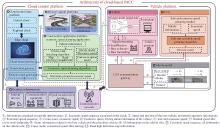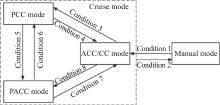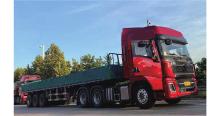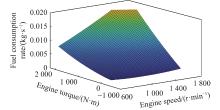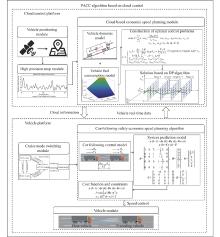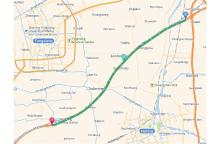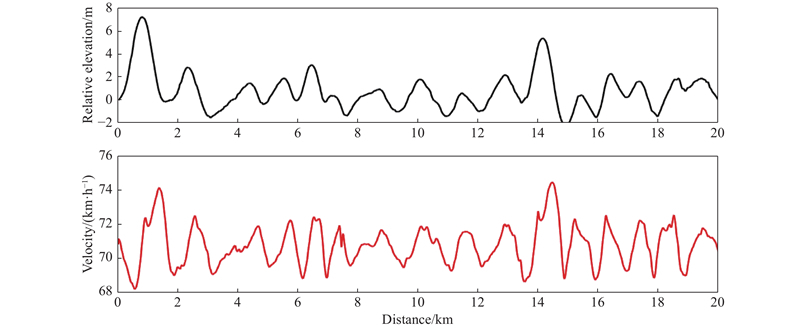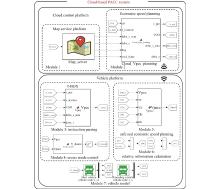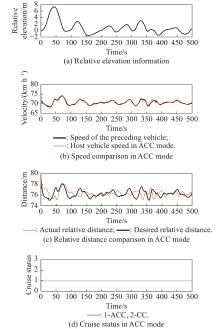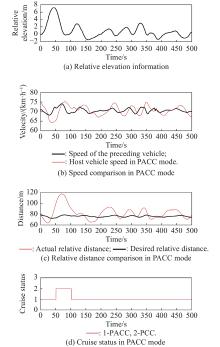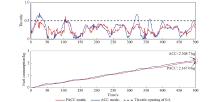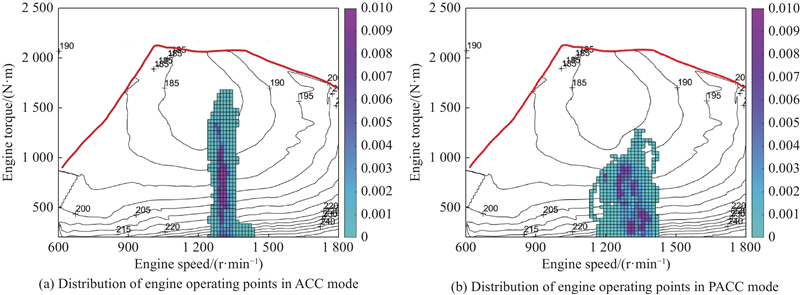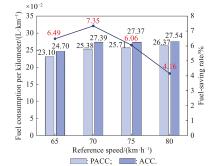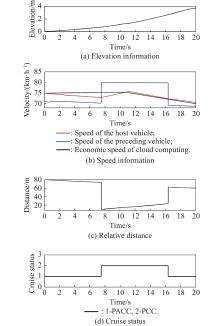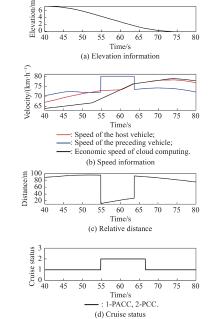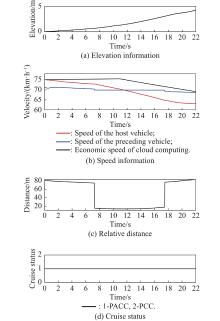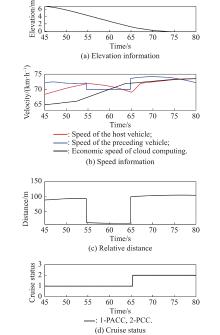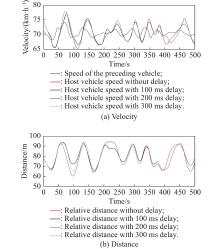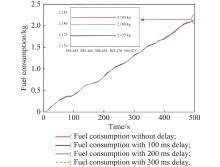Journal of Systems Engineering and Electronics ›› 2024, Vol. 35 ›› Issue (6): 1542-1562.doi: 10.23919/JSEE.2024.000108
• • 上一篇
-
收稿日期:2023-10-31出版日期:2024-12-18发布日期:2025-01-14
Cloud-based predictive adaptive cruise control considering preceding vehicle and slope information
Bolin GAO1,2( ), Luyao WANG3(
), Luyao WANG3( ), Shuyan LI3(
), Shuyan LI3( ), Keke WAN3(
), Keke WAN3( ), Xuepeng WANG4,5(
), Xuepeng WANG4,5( ), Jin ZHANG4,5(
), Jin ZHANG4,5( ), Chen WANG5(
), Chen WANG5( ), Yanbin LIU1(
), Yanbin LIU1( ), Wei ZHONG2,*(
), Wei ZHONG2,*( )
)
- 1 School of Vehicle and Mobility, Tsinghua University, Beijing 100084, China
2 State Key Laboratory of Intelligent Green Vehicle and Mobility, Tsinghua University, Beijing 100084, China
3 College of Engineering, China Agricultural University, Beijing 100083, China
4 College of Artificial Intelligence, Xi’an Jiaotong University, Xi’an 710049, China
5 Weichai Intelligent Technology Co., Ltd, Weifang 261041, China
-
Received:2023-10-31Online:2024-12-18Published:2025-01-14 -
Contact:Wei ZHONG E-mail:gaobolin@tsinghua.edu.cn;wangluyao13@cau.edu.cn;lishuyan@cau.edu.cn;wankeke@cau.edu.cn;wangxuepeng@sinotruk.com;zhangjin@shig.com.cn;wangchen@tongxin.cn;lyb20@mails.tsinghua.edu.cn;zhongwei@mail.tsinghua.edu.cn -
About author:
GAO Bolin was born in 1986. He received his B.S. and M.S. degrees in vehicle engineering from Jilin University, China in 2007 and 2009, respectively, and Ph.D. degree in vehicle engineering from Tongji University, China in 2013. He is now an associate research professor with the School of Vehicle and Mobility, Tsinghua University, China. His research interests include collaborative perception and tracking method in cloud control system, intelligent predictive cruise control system on commercial trucks with cloud control mode, and the test and evaluation of intelligent vehicle driving system. E-mail: gaobolin@tsinghua.edu.cn
WANG Luyao was born in 2000. She received her B.S. degree in vehicle engineering from Hubei University of Automotive Technology, Shiyan, China, in 2022. She is currently a master’s candidate at the College of Engineering, China Agricultural University, Beijing, China. Her research interests include predictive adaptive cruise control and ecological cruise control. E-mail: wangluyao13@cau.edu.cn
LI Shuyan was born in 1972. She received her B.S. and M.S. degrees in vehicle engineering from Jilin University, China in 1995 and 1998. She is an associate professor at the College of Engineering, China Agricultural University. Her research interests are intelligent connected vehicle, predictive cruise control, vehicle power saving and new energy technology, and intelligent testing of agricultural machinery and equipment. E-mail: lishuyan@cau.edu.cn
WAN Keke was born in 1998. He received his B.S. degree in vehicle engineering from Henan University of Engineering, Zhengzhou, China, in 2020 and M.S. degree in vehicle engineering from China Agricultural University, Beijing, China, in 2023. He is currently a joint Ph.D. candidate with the Intelligent and Connected Vehicle of Tsinghua Group and School of Vehicle and Mobility, Tsinghua University. His research interests include cloud-based predictive cruise control, vehicle-road-cloud collaborative control, and cloud control architecture. E-mail: wankeke@cau.edu.cn
WANG Xuepeng was born in 1984. He received his M.S. degree in vehicle engineering from Wuhan University of Technology, China. He is a deputy senior engineering at Weichai Power Co., Ltd. His research interests include intelligent driving path planning to enable vehicles to make flexible decisions based on real-time environmental data, ensuring smooth and safe driving under various road conditions. E-mail: wangxuepeng@sinotruk.com
ZHANG Jin was born in 1982. He received his M.S. degree in materials engineering from Shandong University, China. He is an engineer at Weichai Power Co., Ltd. His research interests are intelligent driving simulation test, time and cost reduction of testing autonomous driving systems and design simulation platform for algorithms. E-mail: zhangjin@shig.com.cn
WANG Chen was born in 1984. He received his B.S. degree from Tsinghua University and M.S. degree from the London School of Economics and Political Science. He is the Director of new business development and assistant economist at Weichai Power Co., Ltd. His research interests include autonomous driving closed-course testing, test results analysis, and validation and correction of algorithms. E-mail: wangchen@tongxin.cn
LIU Yanbin was born in 1986. He received his M.S. degree in software engineering from Zhejiang University, China in 2010. He is pursuing a doctoral degree in innovation leading engineering, School of Vehicle and Transportation, Tsinghua University. His main research interests are the theoretical research and engineering application of data and artificial intelligence driven cloud control systems. E-mail: lyb20@mails.tsinghua.edu.cn
ZHONG Wei was born in 1988. She received her B.S. and Ph.D. degrees from Tsinghua University in 2010 and 2016, respectively. In 2013, she went to the University of Michigan (Ann Arbor) for a research visit at the Department of Mechanical Engineering. From 2019 to 2021, she conducted postdoctoral research at Tsinghua University. She is currently an assistant researcher at the School of Vehicle and Mobility at Tsinghua University. Her research interests mainly focus on intelligent connected vehicle, including system architecture, multi-objective optimization and cloud control platforms. E-mail: zhongwei@mail.tsinghua.edu.cn -
Supported by:This work was supported by the National Key R&D Program of China (2021YFB2501000), the Consultancy Research Project on the Strategic Study of the Integration and Innovative Development of Intelligent Connected Vehicles and New Energy Ecology in Zhejiang Province (2023ZL0007), the Hetao Shenzhen-HongKong Science and Technology Innovation Cooperation Zone (HZQB-KCZYZ-2021055), and the Open Project of the Key Laboratory of Modern Measurement and Control Technology of the Ministry of Education (KF20221123202).
引用本文
. [J]. Journal of Systems Engineering and Electronics, 2024, 35(6): 1542-1562.
Bolin GAO, Luyao WANG, Shuyan LI, Keke WAN, Xuepeng WANG, Jin ZHANG, Chen WANG, Yanbin LIU, Wei ZHONG. Cloud-based predictive adaptive cruise control considering preceding vehicle and slope information[J]. Journal of Systems Engineering and Electronics, 2024, 35(6): 1542-1562.
"
| Condition series | Value of relevant signal |
| Condition 1 | Cruise switch=1 |
| Condition 2 | Constant switch=0, or brake/clutch=1 |
| Condition 3 | Network status=1, and map information=1, and relative distance> |
| Condition 4 | Network status=0, or map information=0 |
| Condition 5 | Network status=1, and map information=1, and relative distance< |
| Condition 6 | Same as condition 3 |
| Condition 7 | Same as condition 4 |
| Condition 8 | Same as condition 5 |
"
| Parameter | Value |
| Vehicle curb mass | |
| Effective tire radius | 0.51 |
| Maximum engine torque | |
| Transmission ratio | 1 |
| Final drive ratio | 3.7 |
| Transmission system efficiency | 0.99 |
| Rolling resistance coefficient | 0.006 |
| Air drag coefficient | 0.69 |
| Gravitational acceleration | 9.81 |
| Frontal area | 9.8 |
"
| Parameter | Value |
| Constant term | |
| First order term of rotary speed | −2.387e−06 |
| First order term of torque | −1.222e−06 |
| Second order term of torque | 1.473e−09 |
| First order term of mixed term | 5.05e−09 |
| Second order term of rotary speed | 6.49e−10 |
"
| Parameter | Value |
| Predictive horizon Y/m | |
| Iteration distance X/m | 200 |
| Discrete interval | 0.2 |
| Reference velocity | 75 |
| Engine speed | |
| Engine speed | |
| Gear position | 15 |
| Maximum acceleration | 0.3 |
| Minimum acceleration | −0.3 |
| Control step size | 10 |
| Prediction step size | 10 |
| Sample time | 0.2 |
| Time constant | 0.45 |
| Time headway | 2 |
| Space constant term | 37 |
| Weight matrix | |
| Weight coefficient | 1 |
| Attenuation coefficient | 0.97 |
| Time constant | 6.67 |
"
| Reference speed/(km/h) | Cruise mode | Average speed/(km/h) | Distance/km | Fuel consumption/L | Fuel consumption per kilometer/(L/km) | Fuel-saving rate/% |
| 65 | PACC | 62.40 | 8.736 | 2.018 | 23.10×10−2 | 6.49 |
| ACC | 65.19 | 9.126 | 2.254 | 24.70×10−2 | ||
| 70 | PACC | 67.98 | 9.52 | 2.415 | 25.38×10−2 | 7.35 |
| ACC | 70.19 | 9.827 | 2.692 | 27.39×10−2 | ||
| 75 | PACC | 70.83 | 9.916 | 2.549 | 25.71×10−2 | 6.06 |
| ACC | 70.88 | 9.924 | 2.716 | 27.37×10−2 | ||
| 80 | PACC | 70.84 | 9.917 | 2.615 | 26.37×10−2 | 4.16 |
| ACC | 70.88 | 9.924 | 2.733 | 27.54×10−2 |
| 1 | Editorial Department of China Journal of Highway and Transport Review on China’s automotive engineering research progress: 2017. China Journal of Highway and Transport, 2017, 30 (6): 1- 197. |
| 2 |
WANG Z, CHU D, GAO B, et al Cloud-based platoon predictive cruise control considering fuel-efficient and platoon stability. Journal of Transportation Engineering, Part A: Systems, 2024, 150 (3): 04023146.
doi: 10.1061/JTEPBS.TEENG-7920 |
| 3 |
MOSER D, SCHMIED R, WASCHL H, et al Flexible spacing adaptive cruise control using stochastic model predictive control. IEEE Trans. on Control Systems Technology, 2018, 26 (1): 114- 127.
doi: 10.1109/TCST.2017.2658193 |
| 4 |
DANG R N, WANG J Q, LI S B, et al Coordinated adaptive cruise control system with lane change assistance. IEEE Trans. on Intelligent Transportation Systems, 2015, 16 (5): 2373- 2383.
doi: 10.1109/TITS.2015.2389527 |
| 5 | LI K Q, DAI Y F, LI S B, et al State-of-the-art and technical trends of intelligent and connected vehicles. Automotive Safety and Energy, 2017, 8 (1): 1- 14. |
| 6 | WU G Q, ZHANG L X, LIU Z Y, et al Research status and development trend of vehicle adaptive cruise control systems. Journal of Tongji University (Natural Science Edition), 2017, 45 (4): 544- 553. |
| 7 | LI S B, XU S B, WANG W J, et al Overview of ecological driving technology and application for ground vehicles. Automotive Safety and Energy, 2014, 5 (2): 121- 131. |
| 8 | HONG J L, GAO B Z, DONG S Y, et al Key problems and research progress of energy saving optimization for intelligent connected vehicles. China Journal of Highway and Transport, 2021, 34 (11): 306- 334. |
| 9 | WANG Y H, LI X K, ZHANG P L, et al Real-time optimization algorithm for truck predictive cruise based on ADAS map. Automotive Engineering, 2020, 42 (10): 1335- 1339,1411. |
| 10 | JU F, MURGOVSKI N, ZHUANG W C, et al Predictive cruise controller for electric vehicle to save energy and extend battery lifetime. IEEE Trans. on Vehicular Technology, 2022, 72 (1): 469- 482. |
| 11 | YAN Y J, LI N, HONG J L, et al Eco-coasting controller using road grade preview: evaluation and online implementation based on mixed integer model predictive control. IEEE Trans. on Vehicular Technology, 2023, 72 (10): 12508- 12523. |
| 12 | BOREK J, GROELKE B, EARNHARDT C, et al Economic optimal control for minimizing fuel consumption of heavy-duty trucks in a highway environment. IEEE Trans. on Control Systems Technology, 2019, 28 (5): 1652- 1664. |
| 13 | LIANG J H, LU Y B, WANG F A, et al A robust dynamic game-based control framework for integrate torque vectoring and active front-wheel steering system. IEEE Trans. on Intelligent Transportation Systems, 2023, 24 (7): 7358- 7341. |
| 14 |
BARKENBUS J N Eco-driving: an overlooked climate change initiative. Energy Policy, 2010, 38 (2): 762- 769.
doi: 10.1016/j.enpol.2009.10.021 |
| 15 | LI K Q, CHANG X Y, LI J W, et al Cloud control system for intelligent and connected vehicles and its application. Automotive Engineering, 2020, 42 (12): 1595- 1605. |
| 16 | CUI M Y, HUANG H Y, XU Q, et al Survey of intelligent and connected vehicle technologies: architectures, functions and applications. Journal of Tsinghua University (Science and Technology), 2022, 62 (3): 493- 508. |
| 17 | GAO R Z, XIA Y Q, DAI L, et al Design and implementation of data-driven predictive cloud control system. Journal of Systems Engineering and Electronics, 2022, 33 (6): 1258- 1268. |
| 18 | GAO B L, WAN K K , CHEN Q E, et al A review and outlook on predictive cruise control of vehicles and typical applications under cloud control system. Machine Intelligence Research, 2023, 20 (5): 614- 639. |
| 19 | LI K Q, LI J Q, CHANG X Y, et al Principles and typical applications of cloud control system for intelligent and connected vehicles. Automotive Safety and Energy, 2020, 11 (3): 261- 275. |
| 20 |
HOU J, SONG Z Y A hierarchical energy management strategy for hybrid energy storage via vehicle-to-cloud connectivity. Applied Energy, 2020, 257, 113900.
doi: 10.1016/j.apenergy.2019.113900 |
| 21 | YU Q W, LI K Q Fuel consumption modeling and evaluation based on AIC. Chinese Journal of Automotive Engineering, 2014, 4 (3): 165- 171. |
| 22 |
LI S Y, WAN K K, GAO B L, et al Predictive cruise control for heavy trucks based on slope information under cloud control system. Journal of Systems Engineering and Electronics, 2022, 33 (4): 812- 826.
doi: 10.23919/JSEE.2022.000081 |
| 23 | LI S Y, LI R, GAO B L, et al. Predictive adaptive cruise control for heavy-duty vehicle based on cloud control system.Proc. of the 25th International Conference on Intelligent Transportation Systems, 2022: 2998−3003. |
| 24 |
CHU H Q, GUO L L, GAO B Z, et al Predictive cruise control using high-definition map and real vehicle implementation. IEEE Trans. on Vehicular Technology, 2018, 67 (12): 11377- 11389.
doi: 10.1109/TVT.2018.2871202 |
| 25 | KIRCHES C, BOCK H G, SCHLODER J P, et al. Mixed-integer NMPC for predictive cruise control of heavy-duty trucks. Proc. of the European Control Conference, 2013: 4118−4123. |
| 26 |
LI S E, GUO Q, XU S, et al Performance enhanced predictive control for adaptive cruise control system considering road elevation information. IEEE Trans. on Intelligent Vehicles, 2017, 2 (3): 150- 160.
doi: 10.1109/TIV.2017.2736246 |
| 27 | MOSER D, SCHMIED R, WASCHL H, et al Flexible spacing adaptive cruise control using stochastic model predictive control. IEEE Trans. on Control Systems Technology, 2017, 26 (1): 114- 127. |
| 28 | XIE S B, QU P C, LI J C, et al Study on coordinated control of speed planning and energy management for connected hybrid electric truck in vehicle following scene. Automotive Engineering, 2022, 44 (8): 1136- 1143, 1152. |
| 29 |
SANKAR G S, KIM M, HAN K Data-driven leading vehicle speed forecast and its application to ecological predictive cruise control. IEEE Trans. on Vehicular Technology, 2022, 71 (11): 11504- 11514.
doi: 10.1109/TVT.2022.3193091 |
| 30 |
HE D F, PENG B B Gaussian learning-based fuzzy predictive cruise control for improving safety and economy of connected vehicles. IET Intelligent Transport Systems, 2020, 14 (5): 346- 355.
doi: 10.1049/iet-its.2019.0452 |
| 31 |
PAN C F, HUANG A B, WANG J J, et al Energy-optimal adaptive cruise control strategy for electric vehicles based on model predictive control. Energy, 2022, 241, 122793.
doi: 10.1016/j.energy.2021.122793 |
| 32 |
JIA Y Z, JIBRIN R, ITOH Y, et al Energy-optimal adaptive cruise control for electric vehicles in both time and space domain based on model predictive control. IFAC-PapersOnLine, 2019, 52 (5): 13- 20.
doi: 10.1016/j.ifacol.2019.09.003 |
| 33 |
ZHANG J H, LI Q, CHEN D P Integrated adaptive cruise control with weight coefficient self-tuning strategy. Applied Sciences, 2018, 8 (6): 978.
doi: 10.3390/app8060978 |
| 34 |
LI Z B, DENG Y M, SUN S L Adaptive cruise predictive control based on variable compass operator pigeon-inspired optimization. Electronics, 2022, 11 (9): 1377.
doi: 10.3390/electronics11091377 |
| 35 |
LIU Z Z, YUAN Q, NIE G M, et al A multi-objective model predictive control for vehicle adaptive cruise control system based on a new safe distance model. International Journal of Automotive Technology, 2021, 22 (2): 475- 487.
doi: 10.1007/s12239-021-0044-0 |
| 36 |
KAMAL M A S, MUKAI M, MURATA J, et al Ecological vehicle control on roads with up-down slopes. IEEE Trans. on Intelligent Transportation Systems, 2011, 12 (3): 783- 794.
doi: 10.1109/TITS.2011.2112648 |
| 37 |
WANG Z P, SUN Z Y, LIU P, et al Intelligent decision support platform of new energy vehicles. Journal of Systems Engineering and Electronics, 2022, 33 (4): 785- 791.
doi: 10.23919/JSEE.2022.000078 |
| 38 |
ZHAO L B, LI B H, YUAN H T Cloud edge integrated security architecture of new cloud manufacturing system. Journal of Systems Engineering and Electronics, 2024, 35 (5): 1177- 1189.
doi: 10.23919/JSEE.2024.000112 |
| 39 | YAN C, XIA Y Q, YANG H J, et al Cloud control for IIoT in a cloud-edge environment. Journal of Systems Engineering and Electronics, 2024, 35 (4): 1013- 1027. |
| 40 | HE D F, LUO J, LIN D, et al Flexible predictive power-split control for battery-supercapacitor systems of electric vehicles using IVHS. Journal of Systems Engineering and Electronics, 2023, 34 (1): 224- 235. |
| 41 |
LU Y B, LIANG J H, ZHUANG W C, et al Four-wheel independent drive vehicle fault tolerant strategy using stochastic model predictive control with model parameter uncertainties. IEEE Trans. on Vehicular Technology, 2024, 73 (3): 3287- 3299.
doi: 10.1109/TVT.2023.3321779 |
| 42 |
FARAJZADEH-DEVIN M-G, HOSSEINI SANI S K Enhanced two-loop model predictive control design for linear uncertain systems. Journal of Systems Engineering and Electronics, 2021, 32 (1): 220- 227.
doi: 10.23919/JSEE.2021.000019 |
| 43 |
MAYNE D Q Model predictive control: recent developments and future promise. Automatica, 2014, 50 (12): 2967- 2986.
doi: 10.1016/j.automatica.2014.10.128 |
| 44 |
MAYNE D Q, RAWLINGS J B, RAO C V, et al Constrained model predictive control: stability and optimality. Automatica, 2000, 36 (6): 789- 814.
doi: 10.1016/S0005-1098(99)00214-9 |
| 45 | XU Q, CHANG X Y, WANG J W, et al. Cloud-based connected vehicle control under time-varying delay: stability analysis and controller synthesis. IEEE Trans. on Vehicular Technology, 2023, 72(11): 14074−14086. |
| No related articles found! |
| 阅读次数 | ||||||
|
全文 |
|
|||||
|
摘要 |
|
|||||
